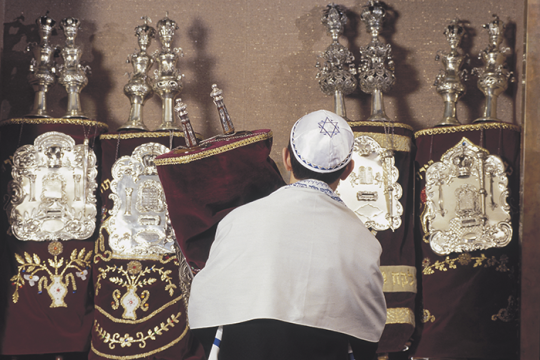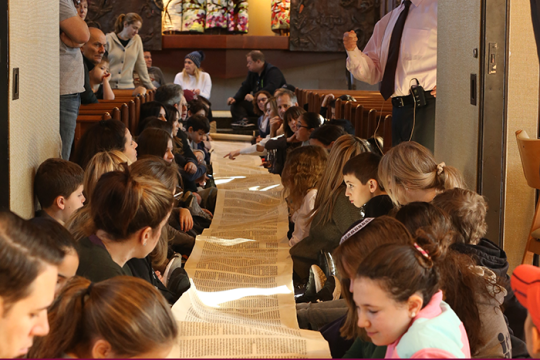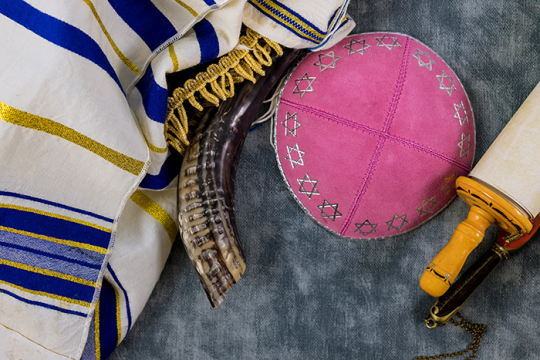How can a young man keep his way pure? By holding to Your word. I have turned to You with all my heart; do not let me stray from your commandments.
-Psalm 119:9-10
Recently a new Reform rabbi in a nearby town asked me if he could put up a poster at Shorashim advertising his congregation's b'nai mitzvah (bar/bat mitzvah) program. Most Reform congregations in Israel function primarily on Friday night, and hold Shabbat morning services only when there is a bar/bat mitzvah. The b'nai mitzvah (bar/bat mitzvah) families are often not long-time members; indeed, providing this service when people need it is a marketing tool for the synagogue. Some families, of course, come and go, but others end up staying involved. (Remember, synagogues in Israel have no religious school, as the public school provides most of the elements of Jewish education; thus, synagogues have no lever of requiring children to attend their school for a set number of years in order to qualify for b'nai mitzvah (bar/bat mitzvah)). Thus, in many cases, the congregation at the b'nai mitzvah (bar/bat mitzvah) service consists entirely of the invited guests. I asked him why he thought Shorashim members would be interested, and he suggested they might be looking for something "more meaningful." I told him we had no objection in principle, but that he shouldn't get his hopes up.
We do maybe a half-dozen "outside" b'nai mitzvah (bar/bat mitzvah) services at Shorashim in a year, where a family from a nearby community without a synagogue (or without an egalitarian synagogue) asks to celebrate in the context of our Shabbat service. These are modest events: the child generally gives a "dvar Torah" on the Torah portion, reads part of the Torah reading, and chants the Haftarah. The family sponsors a modest Kiddush, and then goes off to its own celebration.
For Shorashim kids the event is of a different magnitude. The child prepares and participates (dvar Torah, Torah reading, Haftarah), and often other family members lead part of the service or read from the Torah. After the closing song, all the little kids who had been playing outside come sit on the floor in front, and a member of the community chosen by the family emcees "the program," which varies from event to event, but contains certain constant elements: The Shorashim Choir (whose membership is somewhat fluid, and which only performs at b'nai mitzvahs (bar/bat mitzvah)) sings a medley of songs that have been modified to include references to the celebrant's biography and interests; all the age-mates of the b'nai mitzvah (bar/bat mitzvah) kid perform a skit (coached by one of the parents) making affectionate fun of the celebrant's quirks and interests; usually the siblings do a similar presentation; the parents, and sometimes a grandparent or other relative, speak to and of the celebrant; in conclusion, the last child to celebrate a b'nai mitzvah (bar/bat mitzvah) in the community comes forward to present the "b'nai mitzvah (bar/bat mitzvah) scroll" to the fresh celebrant, who will sign it and keep it until they has to pass it on. After thirty years, this scroll of fake parchment has gotten pretty weighty. In most cases, we then adjourn to the patio and/or the social hall for a kiddush lunch, which begins with the celebrant blessing the challah that they baked as part of the preparation for the day under the supervision of a community member. The meal is organized, set up and cleaned up by members, though now that 150 people is a typical attendance, the main course is usually catered, with salads and desserts contributed by the members. Invited guests are generally in the minority.
The liturgy is pretty standard - no creative prayers. And unfortunately, two customs have waned over the years: the expectation that the child do a project to benefit the community, and an elaborate annual musical comedy involving all the moshav children, starring the year's b'nai mitzvah (bar/bat mitzvah) class. But if the b'nai mitzvah (bar/bat mitzvah) observance is supposed to be about initiation and welcoming of the maturing individual into the community, about celebrating the move from childhood to adulthood, I think our custom is pretty "meaningful." The question is whether we'll be able to sustain it as the community continues to grow.
Originally published in Ten Minutes of Torah and Galilee Diary.
Related Posts

Spicing up my Hispanic Heritage and Embracing Sephardic Traditions

Staying Connected After the B’nei Mitzvah: a Teen’s Perspective


